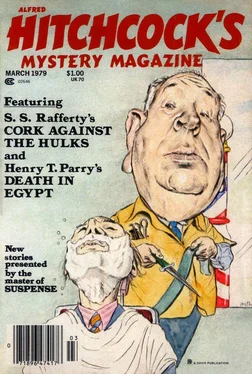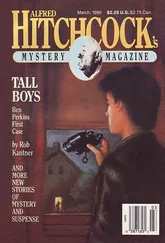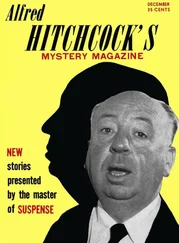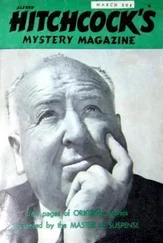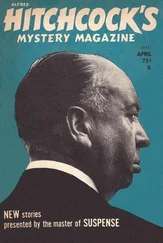Джеймс Холдинг - Alfred Hitchcock’s Mystery Magazine. Vol. 24, No. 3, March 1979
Здесь есть возможность читать онлайн «Джеймс Холдинг - Alfred Hitchcock’s Mystery Magazine. Vol. 24, No. 3, March 1979» весь текст электронной книги совершенно бесплатно (целиком полную версию без сокращений). В некоторых случаях можно слушать аудио, скачать через торрент в формате fb2 и присутствует краткое содержание. Город: New York, Год выпуска: 1979, ISBN: 1979, Издательство: Davis Publications, Жанр: Детектив, на английском языке. Описание произведения, (предисловие) а так же отзывы посетителей доступны на портале библиотеки ЛибКат.
- Название:Alfred Hitchcock’s Mystery Magazine. Vol. 24, No. 3, March 1979
- Автор:
- Издательство:Davis Publications
- Жанр:
- Год:1979
- Город:New York
- ISBN:0002-5224
- Рейтинг книги:5 / 5. Голосов: 1
-
Избранное:Добавить в избранное
- Отзывы:
-
Ваша оценка:
- 100
- 1
- 2
- 3
- 4
- 5
Alfred Hitchcock’s Mystery Magazine. Vol. 24, No. 3, March 1979: краткое содержание, описание и аннотация
Предлагаем к чтению аннотацию, описание, краткое содержание или предисловие (зависит от того, что написал сам автор книги «Alfred Hitchcock’s Mystery Magazine. Vol. 24, No. 3, March 1979»). Если вы не нашли необходимую информацию о книге — напишите в комментариях, мы постараемся отыскать её.
Alfred Hitchcock’s Mystery Magazine. Vol. 24, No. 3, March 1979 — читать онлайн бесплатно полную книгу (весь текст) целиком
Ниже представлен текст книги, разбитый по страницам. Система сохранения места последней прочитанной страницы, позволяет с удобством читать онлайн бесплатно книгу «Alfred Hitchcock’s Mystery Magazine. Vol. 24, No. 3, March 1979», без необходимости каждый раз заново искать на чём Вы остановились. Поставьте закладку, и сможете в любой момент перейти на страницу, на которой закончили чтение.
Интервал:
Закладка:
“That’s a curious customer,” I said above the babbling din.
“More curious than you know, Oaks.”
“We’d best make plans to get out of here since we came on a goose chase.”
“No, we’ll tarry a bit,” Cork murmured solemnly.
“Tarry! Captain, this is insanity! Aymes is dead, and Thatch doesn’t seem to exist. What could we possibly gain by staying in this awful place?”
“Several things. First, is Aymes truly dead? Second, is Thatch here under another name? Third, we have there a ‘curious customer,’ as you call him.” He nodded at a knot of men yarning with Bunch Booth at the middeck. “Most convivial for a former Master at Arms. They’re usually the most hated men aboard any ship.”
“Well, incarceration tends to boil away old bitterness.”
“He’s a liar or something else, you can mark it.”
“A liar? About Aymes’s death? You have no proof.”
“About Aymes being a fine foretopman. Think, lad. The Angel was a cutter, single-mainmasted, built for speed with a great press of canvas, but no foremast in the mariner’s sense. A veteran sailor such as Booth is supposed to be wouldn’t make such a mistake, if he is what he claims. We’ll save time if we split up and talk with as many men as we can. Don’t waste time with anyone who was not in The Angel. I’ll take the forward deck section, and you go aft.”
I started to move, but Cork’s hand stayed me for a second. “Be careful, Oaks. And stay clear of Bunch Booth.”
I began my trek through the mass of ragged men, some sitting mumbling in groups of twos and threes, some standing alone, staring vacantly. Through their grim tatters, I could make out that the majority were soldiers, the length of their beards and the degree of their emaciation grimly indicating the length of their imprisonment.
As I neared the riser of the quarterdeck, I looked up at a strange and pathetic sight. A child, a boy no more than eight or nine, was leaning against the fife rail, feeding bits of bread to a parrot. It was strange that a child should be in this place; pathetic because a few of the morsels fell to the lower deck where a prisoner greedily retrieved the crumbs like a barnyard hen. As I neared the prisoner, he eyed me warily, as if to defend his feeding ground. On my approach, the boy quickly disappeared.
“Yer too late fer breakfast, mate,” the man taunted me. In good health, he was probably thin by nature, but now he looked like a railbird — the appearance heightened all the more by his small stature and beak-like nose.
“Pretty damn cruel, if you ask me,” I said, “letting that child tantalize you with crumbs from a parrot’s mouth.”
The little man cackled. “He’s not tantalizin’, he’s helping his shipmate. You must be new aboard.”
I told him the hospital-ship story. “That little tyke was a crewman?”
“Well, you might say he was. I was the cook aboard Angel , and little Jibs was my galley boy.”
My ears pricked up at the mention of Angel and I let him go on.
“The boy was living with his American grandma in France and the old lady died. He has kin in Massachusetts, so the Frenchies was sendin’ him home. We got jumped and he got took like the rest of us. The lobsterbacks are arrangin’ to send him home, but it’ll take a month, the way they work. Well, at least two from The Angel is gettin’ decent food.”
“I wouldn’t call the crumbs he dropped decent food.”
“Not me. Him and Blackbeard. The parrot. The Lieutenant let him keep the bird for amusement. I guess the British navy ain’t all rotten. I can’t say the same for the Kraut-eaters though. It makes ’em madder than hell because they can’t teach him cuss words. That parrot’s dumb as Job’s turkey.”
I asked after my “old friends,” Aymes and Thatch, and got the same answer we had gotten from Bunch Booth. Aymes was dead and there never was a man named Thatch aboard The Angel.
“Say, if you was a friend of Aymes,” the seacook, who gave his name as Potts, suggested, “you probably got a right to what little gear he had. It ain’t much, but if we ever get off this hellhold you could turn it over to his folks.”
My heart started to beat faster, calling my brain to quarters. If Aymes had left some belongings behind, he might have left the message among them. I looked about in vain for Cork and then, not wishing to lose the opportunity, took action.
“Can I see them?”
“Sure, mate, come on belowdecks.”
I think it was the Italian fellow whom Cork occasionally reads — Diego or Dante something — who described a descent into hell, and now I was living it. The heat mixed with the dampness of rotting timbers created a steamy vapor in the air that carried the awful stench deeper into my lungs.
“Over this way, mate.” Potts guided me in the half light that filtered in from the old gun ports, now latticed with iron bars.
Suddenly, I felt a jolting pain in my throat. My locomotion stopped and, for a moment, so too my awareness, except that I was choking. Somehow my brain cleared enough to ken that a massive arm had encircled my neck and held me in an excruciating death-lock.
“Squirms like an eel, don’t ’e, Bunch?” I heard Potts cackling.
“More like a snake. Hold still, you murderous, spying scum.” The grip grew tighter and I was about to pass out.
“Belay that, Bunch,” I heard the salvation of Cork s voice. “You’re covered.”
Sweet relief of release brought air — still foul, but welcome — back into me. As I rubbed my neck, I could see the Captain standing like a specter in the shadow of a stanchion, a boarding pistol in his hand. He must have secreted it on himself before we left the safe house. Ever practical, I wondered if the flintlock was still damp from our swim, and obviously so did Cork, for he pressed the forward trigger and the spring bayonet flicked into place. Perhaps he did it for effect; he loves drama.
“So it’s the other one,” Bunch growled, “and right as a true bearing I was about you two. Spies sent among us like bilge rats at the grain sacks. That damned idiot Cunningham didn’t even have enough sense to send a spy who knew somethin’ about sailin’ a ship. Foretopman, hah! He was no sailor a’tall, poor lad. But I ran up yer true pennant when you swallowed that one.”
The Cunningham of whom he spoke was Captain William Cunningham, Provost Marshal of New York. Our dossiers on this black-Irish criminal-turned-soldier bulged with his cruelties.
Cork, still training the boarding pistol on them, asked the Master at Arms, “Why didn’t you accept parole along with the other officers and senior mates?”
Bunch Booth scoffed defiantly. “Same as I told yer butcherin’ Provost, ya lickspittle, parole is to give yer word, and I can’t.” He turned his massive bull head with its scarred face to the quivering Potts. “Sorry, Cookie, we couldn’t have strangled the skinny one for Lady Liberty.” He turned back to Cork. “Well, have at it and make it clean.” He laughed again at an afterthought. “At least you’ll get no scalp from me.”
A strange expression came into Cork’s face, one I’d never seen before. He looked like a stunned schoolboy who had been told that all his sums were wrong. The pistol came down to his side, the bayonet re-sprung and secured in his belt. He came forward to a surprised but still wary Bunch Booth. “You’re a true son of liberty, sir, and I give you my hand on it.”
That handclasp was like two gigantic palmetto leaves entwined, and one of the most manly expressions of mutual respect I have ever experienced. I didn’t have to be told, nor did Cork, why Bunch had refused parole. It went beyond loyalty to his crew and scaled the heights of sacrifice. This rough-and-tumble seaman would, by sheer determination, keep his men’s spirits alive, if not their bodies. He was a walking symbol of diffident fortitude — what the Americans call guts.
Читать дальшеИнтервал:
Закладка:
Похожие книги на «Alfred Hitchcock’s Mystery Magazine. Vol. 24, No. 3, March 1979»
Представляем Вашему вниманию похожие книги на «Alfred Hitchcock’s Mystery Magazine. Vol. 24, No. 3, March 1979» списком для выбора. Мы отобрали схожую по названию и смыслу литературу в надежде предоставить читателям больше вариантов отыскать новые, интересные, ещё непрочитанные произведения.
Обсуждение, отзывы о книге «Alfred Hitchcock’s Mystery Magazine. Vol. 24, No. 3, March 1979» и просто собственные мнения читателей. Оставьте ваши комментарии, напишите, что Вы думаете о произведении, его смысле или главных героях. Укажите что конкретно понравилось, а что нет, и почему Вы так считаете.
